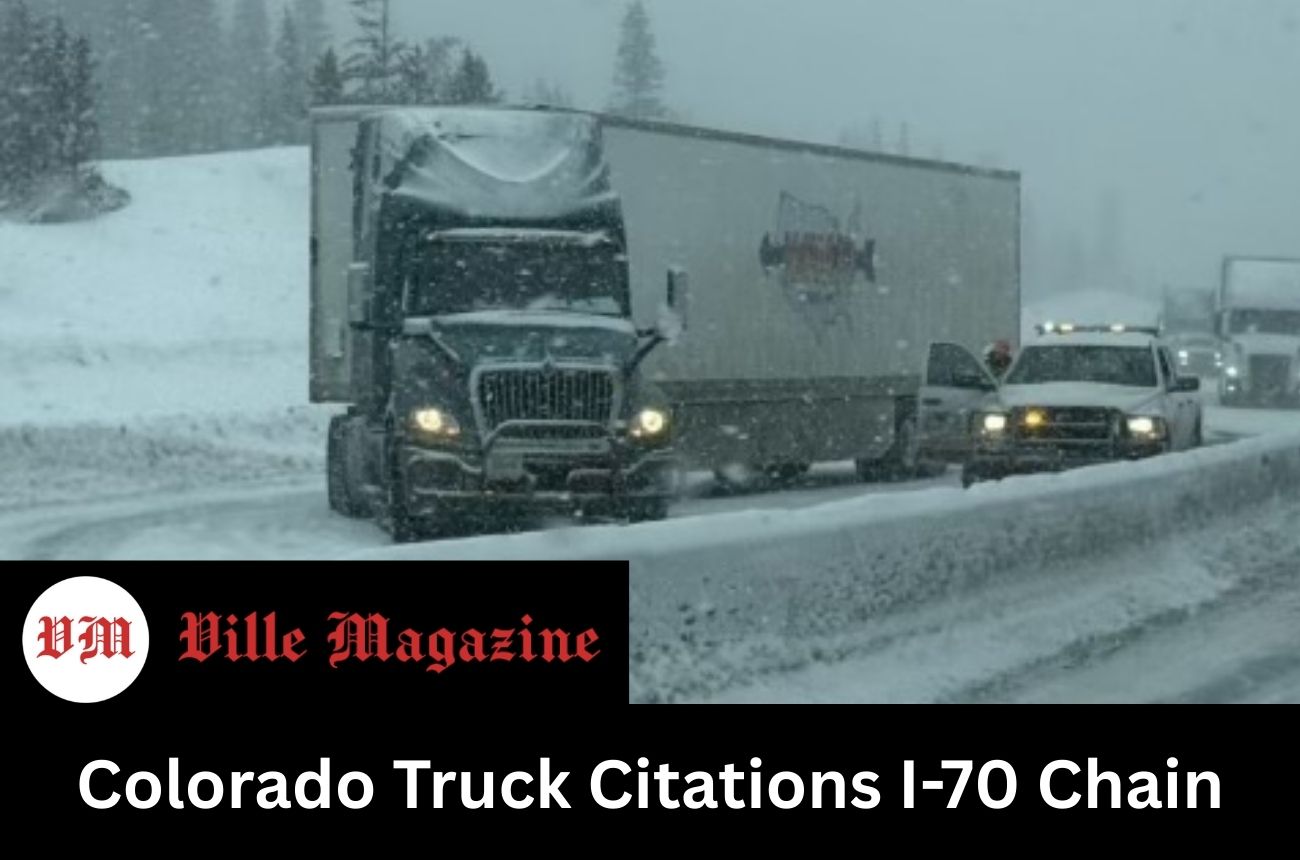Blog
Colorado Truck Chain Laws on I-70: Fines, Rules & Safe Tips

Colorado’s Interstate 70 (I-70), particularly the stretch slicing through the Rocky Mountains, is one of the most hazardous commercial freight routes in the country during winter. Known for its steep grades, sudden snowstorms, and black ice, this corridor becomes a high-risk zone for truckers between September and May.
To tackle the safety and logistical nightmares caused by unprepared commercial motor vehicles (CMVs), Colorado has strengthened its chain law enforcement. This winter season has brought more than just icy roads—it has seen a surge in citations, out-of-service violations, and stricter fines for truckers who fail to comply with the “must carry and use” chain regulations.
This article explores the current laws, enforcement statistics, fines, and solutions truck drivers need to understand to avoid Colorado truck citations on I-70 this winter.
The Basics: Colorado’s “Must Carry” Chain Law for Trucks
Between September 1 and May 31, all CMVs traveling on I-70 between mile markers 133 (Dotsero) and 259 (Morrison) must carry sufficient chains to be fully compliant with state chain-up requirements—even when the pavement is dry.
However, the law doesn’t stop at carrying chains. When CDOT (Colorado Department of Transportation) activates the Chain Law, usually due to snowstorms or icy conditions, chains must be installed immediately. Failing to do so can trigger serious citations, including steep financial penalties and operational delays.
Types of Chain Laws:
-
Code 15 (Commercial Vehicle Chain Law) – Requires all CMVs to chain up. Passenger vehicles must have snow tires or traction devices.
-
Code 16 (Passenger Vehicle Chain Law) – All vehicles must use chains or alternate traction devices during severe conditions.
-
Code 18 (Severe Weather Protocol) – Closures may occur; only essential vehicles are permitted.
Enforcement Surge: Citations, Operations, and Numbers
The 2024-2025 winter season has seen Colorado State Patrol (CSP) and other law enforcement agencies intensify efforts to ensure compliance.
Key Enforcement Highlights:
-
1,836 CMVs stopped in weekly enforcement operations along I-70.
-
109 citations issued for not carrying chains – roughly a 6% violation rate.
-
At the Dumont Port of Entry, 1,382 citations were issued—30% more than last winter.
-
In a single day near Dotsero, 268 trucks were inspected—18 citations issued.
-
Near Aspen, a winter checkpoint cited 14 trucks out of 220 checked, and 7 were placed out of service—a first in the region.
These numbers show that enforcement is no longer sporadic or symbolic—it’s systematic and backed by data-driven targeting.
What Happens If You Don’t Comply? Fines and Penalties
Violating chain laws in Colorado isn’t just a traffic inconvenience—it can cost drivers and carriers thousands in fines and operational downtime.
Current Penalty Structure:
| Violation Type | Fine Amount |
|---|---|
| Failing to carry chains during required season | $133 |
| Failing to install chains during Chain Law | $579 |
| Blocking roadway due to lack of chains | $1,157 |
| Vail Emergency Ordinance – Not carrying chains | $1,500 |
| Vail Ordinance – Blocking road due to spin-out | $2,650 |
According to Senator Greg Fulton, these penalties—especially the $2,650 fine—represent the maximum allowed under state law and are meant to serve as strong deterrents.
Why the Clampdown? Safety, Commerce, and Community Impact
I-70 is a lifeline for Colorado’s economy. Any traffic disruption affects not only the trucking industry but also tourism, emergency response, and the daily lives of mountain residents.
The Ripple Effect of Spinouts:
-
Vail experienced 99 full closures in 2024, with estimated economic losses exceeding $300 million.
-
Each hour of road closure on I-70 costs communities an estimated $2 million in lost commerce, tourism, and supply delays.
-
60% of truckers fail to chain up, according to Vail Mayor Travis Coggin, prompting calls for more severe penalties and better support systems.
The goal isn’t just punishment—it’s to keep roads open, communities connected, and critical services running.
Challenges from the Truckers’ Perspective
Truckers aren’t ignoring the law out of negligence. Many face real-world challenges that complicate compliance.
Top Trucker Concerns:
-
Late or poor signage about chain law activation.
-
Unsafe conditions for pulling over or chaining up—especially on narrow shoulders or during storms.
-
Wear and tear from chains on dry pavement.
-
Inadequate training in chain installation and safety procedures.
-
Driver fatigue, which can turn chaining up in a blizzard into a life-threatening ordeal.
Veteran driver Tommy Lee called an unprepared I-70 winter drive “potentially the worst drive of your life.”
Truckers want to comply—but they need better tools, education, and infrastructure to do so safely.
Solutions & Legislative Efforts: Beyond Fines
Recognizing that fines alone won’t solve the problem, Colorado has rolled out several support initiatives—some already in motion, others pending legislation.
Current and Proposed Solutions:
-
Third-Party Chain Assist Services:
Truckers can now access licensed vendors at designated pull-off areas to help install chains safely and quickly. -
Senate Bill 69:
Proposes:-
Allowing roadside businesses to offer chain-up services.
-
Requiring rental companies to inform customers about chain laws.
-
-
More Chain-Up Stations:
Lawmakers are pushing for expanded chain-up areas along I-70, especially before steep grades like Eisenhower Tunnel or Vail Pass. -
Right-Lane Restrictions:
Steep and icy zones now enforce right-lane-only rules for CMVs to prevent jackknifing and dangerous passing. -
Education Partnerships:
The Colorado Motor Carriers Association (CMCA) is working with law enforcement to train drivers, distribute winter safety checklists, and promote preparedness.
Safe Tips for Truckers on I-70 This Winter
To avoid Colorado truck citations on I-70 and ensure personal safety, truckers should follow these best practices:
Before You Hit the Road:
-
Carry chains at all times between Sept 1 – May 31.
-
Review weather updates and CDOT chain law alerts before departure.
-
Use high-quality chains designed for your specific truck tires.
-
Practice chaining up in dry conditions to improve efficiency.
On the Road:
-
Use designated chain-up areas—never chain up on shoulders unless in emergency.
-
Watch for CDOT variable signs indicating chain law status.
-
Pull over safely and avoid blocking lanes during installations.
-
Report unsafe or obstructed chain stations to CSP or CDOT.
If Chain Law is Activated:
-
Don’t delay—chain up immediately in a designated area.
-
Use headlamps, vests, and safety cones during nighttime chain-ups.
-
Drive cautiously even with chains—icy conditions can still be treacherous.
Conclusion
Colorado’s evolving approach to the I-70 chain law is a balance between strict enforcement and real-world support for truckers. With increased citations, steeper fines, and out-of-service designations, the pressure is on for CMVs to prepare or pay.
But it’s not all about punishment. Through smart legislation, roadside assistance, better signage, and ongoing dialogue with the trucking industry, Colorado is working to ensure that commerce keeps flowing, communities remain accessible, and lives stay safe during the harshest months of the year.
-

 Celebrity4 months ago
Celebrity4 months agoJamie White-Welling: Bio, Career, and Hollywood Connection Life with Tom Welling
-

 Celebrity4 months ago
Celebrity4 months agoChristina Erika Carandini Lee: A Life of Grace, Heritage, and Privacy
-

 Celebrity4 months ago
Celebrity4 months agoTrey Kulley Majors: The Untold Story of Lee Majors’ Son
-

 Celebrity3 months ago
Celebrity3 months agoApi Robin: The Quiet Force Supporting Celeste Barber
















